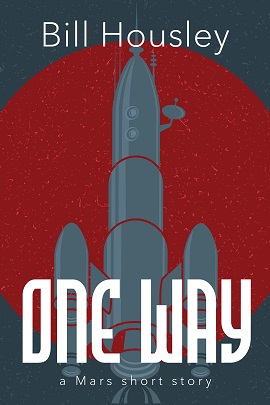Explore-nation or Stag-nation?
 I read a blog article yesterday on Time to Eat the Dogs (great blog BTW) that argued against the benefits of human space flight. It correctly pointed out the difference between the words “Exploration” and “Expedition” making the following points that I will address one at a time.
I read a blog article yesterday on Time to Eat the Dogs (great blog BTW) that argued against the benefits of human space flight. It correctly pointed out the difference between the words “Exploration” and “Expedition” making the following points that I will address one at a time.
By the way, my apologies to the author, I could not find your name on the post to give you proper credit. However, maybe you’ll see this post through a pingback or something and chime in on my comments.
“Even if we accepted, for the sake of argument, that an exploration impulse is part of human nature, it still does not mean that we should obey this impulse.”
Correct, but that impulse should not be suppressed either. Our species must expand, learn, and grow, it is part of the nature of our beings. While I agree that the “If it feels good, do it” philosophy is not a good thing in and of itself, I do agree with a slight rewording of it, “If it feels good, then at least look into it and see if it’s beneficial”.
 The wealth building of nations hinges on the cutting edge of advancement into new products, markets, and “land”. True, that very often kills other markets, products, and industries in the process, but it is usually financially better for the people of any nation to know more than less. What is the largest industry in many of the nations of Europe? Tourism. People paying to see the bones of past glory. That is all that is left of the dinosaurs, and will be all that is left of the financial health of nations which do not keep up. I love the following quote, “Unless you’re the lead dog, the view never changes”.
The wealth building of nations hinges on the cutting edge of advancement into new products, markets, and “land”. True, that very often kills other markets, products, and industries in the process, but it is usually financially better for the people of any nation to know more than less. What is the largest industry in many of the nations of Europe? Tourism. People paying to see the bones of past glory. That is all that is left of the dinosaurs, and will be all that is left of the financial health of nations which do not keep up. I love the following quote, “Unless you’re the lead dog, the view never changes”.
“…proponents admit that any benefits (of spin-off technologies) are unforeseen.”
This is an uninformed and narrow-minded argument that reflects an open ignorance of the very nature of innovation as well as the history of space related spin-offs. Sorry to be so abruptly negative, but I can think of no other reasonably informed response to this comment.
 Innovation usually comes by surprise, and the precise extent of its effects on our culture and industries are generally unforeseen. The above argument essentially says, “We have no idea where the ball will go, so why swing?” My answer, “Because the point isn’t where the ball will go, but to keep the ball moving.” Without people engaged in the risks of playing the game, the ball will just sit on a shelf and no one will ever know what could have happened.
Innovation usually comes by surprise, and the precise extent of its effects on our culture and industries are generally unforeseen. The above argument essentially says, “We have no idea where the ball will go, so why swing?” My answer, “Because the point isn’t where the ball will go, but to keep the ball moving.” Without people engaged in the risks of playing the game, the ball will just sit on a shelf and no one will ever know what could have happened.
Spin-off technologies are not the pie-in-the-sky hope that the above blog quote suggests. Just because we don’t know specifically which advances will spin-off doesn’t mean that the spin-offs won’t occur. We must either look to the general history of spin-offs and expect that same successful trend to continue, or find a reason to believe that the trend will stop. I would encourage all those who remain uninformed about space exploration spin-offs to read up before spouting off about them or risk looking stupid. Click here to see just one example among thousands. Also, before you say, “That would have happened anyway” first ponder the differences between the words “discover”, “refine” and “develop”.
Furthermore, innovation usually results from looking at something from another direction, and is frequently not directly related or even dependant on the object studied. New innovations also often carry a negative impact on competing industries that will oppose them if they get the chance. A random, in-direct spin-off that nobody sees coming can have a better chance of survival than one which can be anticipated and legislated against by the senators of states which are dependent on certain industries, or private inventions whose undeveloped patents can be purchased and shoved in a drawer to maintain the status quo.
“The United States did gain prestige from landing astronauts on the moon in 1969, showing up our Cold War rival, the Soviet Union. But how much did that prestige, or ‘soft power’ actually benefit the United States?”
 “Soft power” was never the point. There was another race taking place at the time, one to ensure our very survival as a constitutional democracy. After World War II there developed a new competition against a nation which ascribed to the Marxist maxim that Communism could not be fully successful unless it was global. No one possessed any counter to the threat of dangerous things falling down from the sky, and the “space race” to the moon was actually a development race to ensure that we stayed ahead of the U.S.S.R militarily in the field of rocketry, as a deterrent, and in technology in general. Russia never succeeded in landing humans on the moon (someone correct me on that if I’m wrong), and spent the entire cold war one step behind us in numerous areas.
“Soft power” was never the point. There was another race taking place at the time, one to ensure our very survival as a constitutional democracy. After World War II there developed a new competition against a nation which ascribed to the Marxist maxim that Communism could not be fully successful unless it was global. No one possessed any counter to the threat of dangerous things falling down from the sky, and the “space race” to the moon was actually a development race to ensure that we stayed ahead of the U.S.S.R militarily in the field of rocketry, as a deterrent, and in technology in general. Russia never succeeded in landing humans on the moon (someone correct me on that if I’m wrong), and spent the entire cold war one step behind us in numerous areas.
“If we cannot take care of a 197 million square mile habitat that’s free, self-regulating, and self-sustaining, what makes us think that we’re going to do any better on multi-billion dollar artificial habitats on other planets?”
 On this point, I fully agree. In fact, I would go one step further and pronounce that only interstellarspace travel would serve to “seed the species”. I think that human habitations on the Moon or Mars would depend deeply and permanently on Earth for survival. If some catastrophe struck the Earth that killed off our species (or more likely, knocked us back to the stone-age), anyone living on the Moon or Mars would die off by extension.
On this point, I fully agree. In fact, I would go one step further and pronounce that only interstellarspace travel would serve to “seed the species”. I think that human habitations on the Moon or Mars would depend deeply and permanently on Earth for survival. If some catastrophe struck the Earth that killed off our species (or more likely, knocked us back to the stone-age), anyone living on the Moon or Mars would die off by extension.
However, I would point out my above comments about unanticipated spin-offs. In the same way that burnt rain forests squander countless opportunities in the field of medicine by wiping out untold numbers of undiscovered and unstudied species of plant and animal life, we would squander many similar opportunities in the area of environmental and life sciences by not attempting to figure out how to keep humans alive for long periods of time in hostile alien environments. Also, what better way to foster a stronger interest in the health of our own precious world than by closely exploring the complications inherent in living without it?












Hi Bill. Thanks for the thoughtful response to my post and the kind words about my blog. Here are some thoughts.
“Our species must expand, learn, and grow, it is part of the nature of our beings.”
I agree with you that learning and growing are two of the most marvelous traits of our species. (I’m more circumspect about the expanding part- first of all expanding one’s habitat is common to most species not just our own and second expanding often comes at the expense of other species or environments). Where I disagree is in thinking that human space flight is the most fruitful way of learning and growing. My feeling is that we have learned a lot more about the universe from Hubble, Voyager, Viking, and Mariner than we have from Apollo, Mercury, and Gemini. Even if we view “learning and growing” in broader or symbolic terms (e.g learning about the power of the human spirit) I would say that this is a very expensive way to learn a lesson that can be learned in other arenas here on earth.
“Innovation usually comes by surprise, and the precise extent of its effects on our culture and industries are generally unforeseen.”
True enough. Human spaceflight programs have generated a number of positive, unanticipated advances in enriched baby food, ribbed swimsuits, water purification systems, and even athletic shoes. (Many of the other, arguably more important, spin-offs in semiconductor design, telemetry systems, and radiation insulation were the product of robotic space programs.)
But I think you miss my point here. I don’t think we should AVOID projects that may have unforeseen benefits, but I don’t think unforeseen benefits should serve as the key rationale for such projects. I am happy that Apollo led to the development of freeze-dried foods, new reflective material insulation, and flame-resistant textiles.
But to say that we spent $97 billion dollars to send astronauts to the moon in order to develop freeze dried foods and other spin-offs is like saying that we built the Empire State Building because of its excellent views of Manhattan. Almost all big-science and big-technology programs, from the CERN particle accelerator to the building of the Golden Gate Bridge, have yielded new technologies. But they are the windfalls of discovery, not the object and should not be confused with such.
“The ‘space race’ to the moon was actually a development race to ensure that we stayed ahead of the U.S.S.R militarily in the field of rocketry, as a deterrent, and in technology in general.”
I disagree. By the late 1960s, American and Soviet military leaders had come to see robotic spaceflight as more advantageous to national security than human spaceflight. In the U.S., the Manned Orbital Laboratory (MOL) — a project to send US officers into orbit for reconnaissance — was scrapped by the military because it was so expensive and because robotic reconnaissance was already capable of doing the job. The USSR came to the same conclusion, scrapping its Almaz human military reconnaissance program in 1978. Even advocates of human spaceflight largely agree that the political value of winning the “Space Race” was in enhancing the global reputation of the U.S not in advancing a specific military strategy or technology. The point of my post was to say that whatever soft-power was gained from Apollo did not influence the outcome of the war in Vietnam, the Arab Oil Embargo, economic stag-flation, etc. Why, then, should put a premium on the value of national prestige in appraising the benefits of the Constellation Program? What will such prestige gain the United States in practical terms? And will it be worth the 1 trillion dollar price tag?
“We would squander many similar opportunities in the area of environmental and life sciences by not attempting to figure out how to keep humans alive for long periods of time in hostile alien environments.”
One day we may face threats to our species survival here on earth. But the Constellation Program would not help us face that threat. Its human outposts on the Moon and Mars would not have been self-sustaining. Nor is there anything in NASA’s mission statement, established by the 1958 National Aeronautics and Space Act, that directs the agency to establish settlements or colonies in space. Such massive, expensive, and forward-looking projects may one day be necessary. But they will develop from the discovery of an immanent planetary threat and/or the extensive participation of private space industries and international partners.
thanks again for your response.
Michael Robinson
Michael,
Thank you for your quick and considerate response.
You are absolutely correct in your remarks that human spaceflight is not the most cost effective approach to exploration and discovery. I personally see Hubble and Cassini as two current missions that have yielded far more (and further reaching) science than manned missions are currently capable of, and they will only get better. Further, we should not risk sending humans anywhere until we have learned all we can about the destination ahead of time through probes.
However, for every engineer that works to design a robotic probe there used to be a college student, before most college students there was a high school graduate, and before each high school graduate there was a child doing his or her math and science homework. This is what I am saying about not denying the exploratory impulse—there is a reason why the spacecraft that we send people up in have windows. How many kids want to be fighter pilots and never do, but the pursuit of that goal ends them up in a great career in some other area of aerospace?
Which do you think sounds better to my 6 year old son?
“Someday, if you get good grades and study hard you might be on a team of scientists that design and build the next generation of Mars rover that will take a new series of soil samples and close-up photographs of Mars.”
or
“Someday, if you get good grades and study hard, you might walk on Mars.”
Saturn is his favorite planet and he thinks it’s way cool that my book has a painting of Saturn on the front. My illustrator used current Cassini photos of Saturn and Mimas as a basis for that artwork. So should I tell my son…
“Someday, if you do your math and work hard in school, you can be on a team of scientists that design and build an even better Saturn probe to take even cooler photos and videos of Saturn and its moons.”
or
“Someday, if you do your math and work hard in school, you might look out the window of a spacecraft at Saturn and see it like that with your own eyes…close-up.”
As for spinoffs, you are correct that all scientific endeavors yield spinoffs. Click here then reply again. NASA’s yearly budget amounts to almost a rounding error in the annual spending by the Federal Government. No other Federal expenditure yields more fruit in new innovations and science per dollar per year. Now there is no reason to believe that a space exploration program consisting soley of robotic probes would not yield an equally large list, but the point I made in my post is that there would not be near as many items on that list effecting human biology.
The science collected by robotic probes moves more slowly than human feet on the ground do too. We spend 5 to 10 years designing a probe to answer a question, then we send it on a flight of however long it takes and get the answer. This generates a whole new set of questions so we design and launch another probe. With probes, each round of questions takes a decade to answer and the design of each probe and experiment has to be frozen at current levels of technology before it can be built. Further, there is a maddening control lag between the probe and its handlers on Earth caused by light-speed communications, planetary rotations, and the orbital motions of planets around the sun, and the further out we send the probes the worse that light speed communications lag gets. Humans on the ground answer the layers of questions much faster. Humans with diverse expertise, on a routine schedule of comings and goings, yield still more results still more rapidly. Still greater results come from habitations like the ISS where they live and work and can conduct many layers of experiments over longer periods of time. Powerful space-based robotic observatories and probes like Hubble cannot be done any better with humans on board, and we can send probes like Cassini much further (in part because we don’t have to retrieve them). However rovers can and eventually should be replaced by humans.
Everyone can see that robotic missions are far less expensive, and there are definitely things which Hubble and Cassini can do that sending humans could not help with. What I am saying is that there still needs to be a new, human spaceflight goal, a new frontier for footprints in the regolith to generate the fire that forges all of these other efforts and fills in the gaps where robots lack. We should do both, not one or the other.